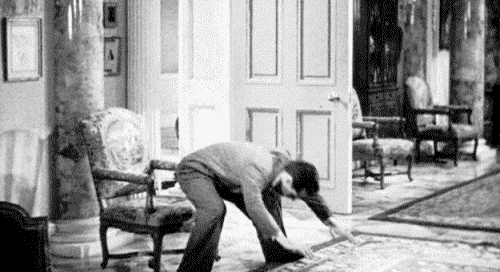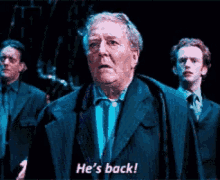Volume 5, Issue 1: Cary Grant, Acrobat
A Call for Video Essays (& PechaKuchas!) for the 2024 Cary Comes Home Festival
Hello all!
It has been … too long. While this newsletter has been on hiatus for the past several months, The Video Essay Podcast has been in full swing. One of the most exciting things of the past year has been collaborating with the team, "The Video Essay: Memories, Ecologies, Bodies," a three-year research project on video essays led by Kevin B. Lee, Evelyn Kreutzer, and Johannes Binotto, and funded by the Swiss National Science Foundation.
Thus far, the collaboration has yielded five episodes; “On Weirdness & Videographic Memory,” “On Videographic Berlinale,” “Making Video Essays About Alice Diop,” “On The Extended Play,” and “The Importance of Writings on Video Essays.”
The podcast has also partnered with Alison Peirse, a horror film scholar and professor at the University of Leeds, who led the project Doing Women’s (Global) (Horror) Film History (DWGHFH). More conversations on the project are on the way, but thus far I have interviewed Alison about the project, and conducted an interview with two video essayists who contributed to the project, Krista Calvo and Colleen Laird.
In January, I talked with director Kleber Mendonça Filho about his essayistic documentary, Pictures of Ghosts. In April, I talked with director Christopher Jason Bell about his ten-part found footage series, Miss Me Yet, which documents the presidency of George W. Bush.
A highlight of my year came in May, when I traveled to London to interview Daniel Chávez Heras at the King's Festival of Artificial Intelligence. We talked about his new book, Cinema and Machine Vision: Artificial Intelligence, Aesthetics and Spectatorship. It was the first live recording of the podcast, and something I hope to do more of in the future!
Many more conversations have been recorded and are in the pipeline, so please be on the lookout! While I fully intend to return to writing this newsletter once a month, please also be sure to subscribe wherever you get your podcasts.
Cary Grant – Acrobat
I’m also very happy to share that the podcast is once again partnering with the Cary Comes Home Festival to publish video essays about Mr. Cary Grant. For those who are new to video essaying, or for those who do not have time to create a full video essay, we are also accepting submissions of one-minute Videographic PechaKuchas (more details below), which will be assembled into one long video and screened online during the festival.
In 2020, the festival and podcast partnered on a similar initative, “The Journeys of Cary Grant.” In 2022, we partnered on “Cary Grant: A Class Act.” The deadline for this year’s program is November 19, 2024.
For more information on how to submit, see below.
Call for Video Essays
The Cary Comes Home Festival, in partnership with The Video Essay Podcast
The Sixth Cary Comes Home Festival focuses on Cary Grant as an acrobat. Cary Grant, born Archibald Leach in Bristol in 1904, trained as an acrobat with the Pender Troupe of Knockabout boys. This acrobatic training is evident in his physical onscreen performances in some of his best-loved films, from pratfalls and tumbles in Bringing Up Baby to dodging a crop-duster in North by Northwest. To celebrate the 120th anniversary of his birth, we invite you to submit video essays on the theme of Cary Grant as an acrobat.
We want to explore Cary Grant as a showman, from his training as an acrobat and apprenticeship on the vaudeville circuit and Broadway to how this is evidenced in his physical on-screen performances. We encourage submissions that explore the following themes, but we’re very open to other interpretations:
“The Greatest Show on Earth”: An exploration of circus and performance, focusing on the impact of Grant’s acrobatic training on his film career.
“Slapstick Prince-Charming”: Inspired by Pauline Kael’s description of Grant, this theme could focus on his screwball comedies
Leading Ladies, explore how his co-stars interact with his physical performances and their own physicality on screen, such as Katharine Hepburn’s athleticism.
Early Influences and Comedy Legacy: Drawing on the silent films Archie Leach watched in Bristol cinemas as a boy and examining how these early influences shaped his comedic style. And how do Cary Grant’s performances impact other filmmakers?
The Art of Cary Grant – In Action: thinking about his physical prowess and how he performed some of his own stunts
Movement and Performance: examining the way he moves, from his facial expressions and gestures to the way he walked, his grace and style
Video essays should be between 5 and 20 minutes in length and submitted by Tuesday 19 November 2024. Selected essays will be featured during our festival from November 29 to December 1, 2024.
But you don’t have to make a full blown video essay!
In attempt to encourage those with varying levels of video editing proficiency, we will also accept submissions of Videographic PechaKuchas. What is a PechaKucha? Developed by Christian Keathley and Jason Mittell, a PechaKucha is an exercise designed for video essay beginners. It’s simple: select a Cary Grant film, choose ten clips from the film of exactly six seconds each, pair them with one minute of continuous audio, and then you have a mini, one-minute video essay! You can find dozens of examples here.
We will then take the submitted PechaKuchas (you’re welcome to submit more than one, or a PechaKucha and a video essay!) and edit them into one long supercut dedicated to the acrobatics of Cary Grant.
Please submit your entries using the link below and join us in celebrating the life and legacy of Cary Grant through his remarkable physicality and showmanship.
Guidelines
We are open to all forms of audio-visual criticism, including video essays, fanvids, and any kind of video that reappropriates footage of Cary Grant.
Videos of any length will be accepted but the ideal length will be between 5-6 minutes.
All submitted work will be featured on the Cary Comes Home website and on The Video Essay Podcast website. Some of the best work will be featured on an episode of The Video Essay Podcast which will be recorded live at the virtual festival in November. Creators will be invited to join the conversation.
Please add “For Study Purposes Only” at the end of the video, include a list of the sources of clips used, any references cited and ideally, if you want to use a backing track, please only use copyright-free music for that purpose. If you use copyrighted music, we may not be able to feature your work at the festival.
You will need to upload to your own Vimeo page. Learn more about uploading in their Video Guidelines, Compression Guidelines, and Help Center.
If you are new to making video essays you might want to check out the series of videographic exercises listeners were assigned as “homework” on The Video Essay Podcast, here.
Rolling Deadline until: Tuesday 19 November 2024
We’ll begin to post submissions to the website from September.
Cary Comes Home is a biennial festival which aims to celebrate Cary Grant’s Bristol roots, develop new audiences for his work and recreate the golden age of cinema-going, directed by Dr Charlotte Crofts (Associate Professor of Filmmaking, UWE Bristol). The festival will take place online this year, 29 November – 1 December 2024. Learn more at www.carycomeshome.co.uk
The Video Essay Podcast, hosted by Will DiGravio, features interviews with critics, scholars, filmmakers, and other leading creators of videographic criticism. The show is accompanied by a weekly newsletter, ‘Notes on Videographic Criticism,’ which features original essays, interviews, and links to events and news related to the form. Learn more at www.thevideoessay.com.





